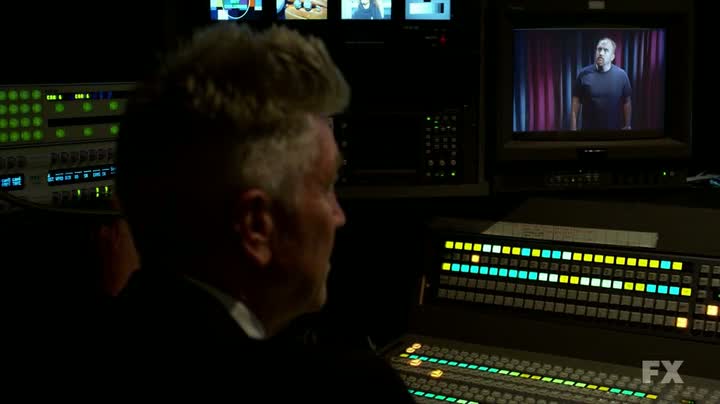
Louie, Season 3, Episodes 10-12: “Late Show”
Written by Louis C.K.
Directed by Louis C.K.
Airs Thursdays at 10:30pm ET on FX
For all of its open disregard for TV norms, Louie hasn’t often strayed from its pattern of getting the job done, story-wise, in 22 minutes or less. Even when the show attempted a two-parter earlier this season, it was divided into two discrete halves that functioned just fine on their own. “Late Show,” which unspooled over the last three episodes of Louie, is something different: it’s essentially a medium-length film that happened to air in three segments over an agonizing four weeks. Watched back-to-back as a 60-minute saga, it’s one of the most satisfying things to come out of Louie yet, which is no small feat.
The premise is far more inside-showbiz than anything CK has attempted on the show before, enabling him to double down on guests – though not necessarily of the sort you’d expect. After killing it on a super-sized Leno appearance, Louie is approached by a head honcho at CBS (played by Garry Marshall in a truly showstopping scene), who informs him that David Letterman is finally about to depart his post at the Late Show, and Louie is being considered as a low-cost alternative to the current favorite, Jerry Seinfeld. Louie is so stunned by the offer that he immediately turns to his ex-wife Janet (once again played by Susan Kelechi Watson) in hopes that she’ll dissuade him – only to rebuff him and his fears that he’ll be spending too much time away from the kids (“they don’t need a father that much”). Accepting the opportunity, he meets with an eccentric, old-school producer, Jack (played by David Lynch, in what must be the most awesome bit of casting in the show’s history), who offers cryptic advice and even more cryptic tests of his comedic prowess.
Only Louie would contrive an alternate-universe showbiz narrative and then give far more screentime to Lynch than the more obvious guests that litter the episodes (Jay Leno, Chris Rock, Jerry Seinfeld, Paul Rudd, etc.), but that sort of open rulebook chucking is on par. What is surprising about “Late Show” is how triumphant CK lets the story’s hard-won final moments be, and how liberating it is to see Louie score a win of any kind – even a symbolic one – in a season that’s seen him at his most relentlessly downtrodden. With the news that his actually-pretty-kickass test episode merely served as a negotiating tactic for CBS, Louie manages to take comfort in a job done well – not to mention the satisfaction of robbing Letterman of millions. It’s not being the New King of Late Night, but it’s something.
“Late Show” is all about the terror of opportunity. Louie is so set in his ways, so sure that no good will ever come of his daily grind as a comic, that the notion of instant fame and fortune leaves him almost immobile with fear. Every new challenge, whether it’s in the form of Jack’s bizarre tests, or his network-mandated boxing lessons (coached by none other than Isiah Whitlock Jr., aka The Wire‘s Clay Davis), is greeted with a mixture of stunned indifference and spiteful contempt. The terms of this potentially seismic event are laid out beautifully in Marshall’s monologue: “You’re circling failure in a rapidly decaying orbit. That’s the reality as we talk now. But you can change that.”
The use of Lynch as the arc’s most prominent guest is a stroke of genius. Not only is it a tremendous thrill to see Lynch act on TV for the first time since Twin Peaks, but the way CK channels the surreal vibe of Lynch’s TV and film work – the low-level drones, the receptionist being played by two different actresses, the sheer red carpet, and especially the unsettling sequence in which Lynch briefly becomes the test-show host himself – perfectly reflects just how caught off-guard Louie is by the entire experience.
What’s most surprising about “Late Show” is the way its placement this late in the season makes so much sense. We’ve had nine straight weeks of Louie, for the most part, failing, whether or not he was trying in the first place. The show has set us up to expect Louie to respond pathetically to every challenge, especially this season, so when we get those final moments of gleeful Letterman-baiting, it’s a genuinely stirring bit of televison. Its late placement also makes the damn-near-saccharine scenes between Louie and his daughters that crop up late in Pt. 3 easier to swallow: he’s earned some cheap pathos, damn it!
Finally, who wouldn’t watch Late Show With Louie CK? Louie does his damndest in the end, managing to merge his own personality and style of humor with the demands of late-night hosting. It’s a thing of beauty, managing to make the entire what-if scenario, which seemed almost surreal in its randomness when Garry Marshall’s chairman first uttered the words “David Letterman is retiring,” actually plausible. When viewed as a negotiating tactic (as it’s explicitly framed here), it’s not the most outlandish idea, and the glimpse we get of Louie’s show rewards the network’s faith in his ability to at least make a solid go of it. That “Late Show” manages to incorporate both Lynchian surreality and a believable alternate reality speaks to the strength and versatility of Louie, and begs the question of just how CK will choose to take the season out next week.
Simon Howell


